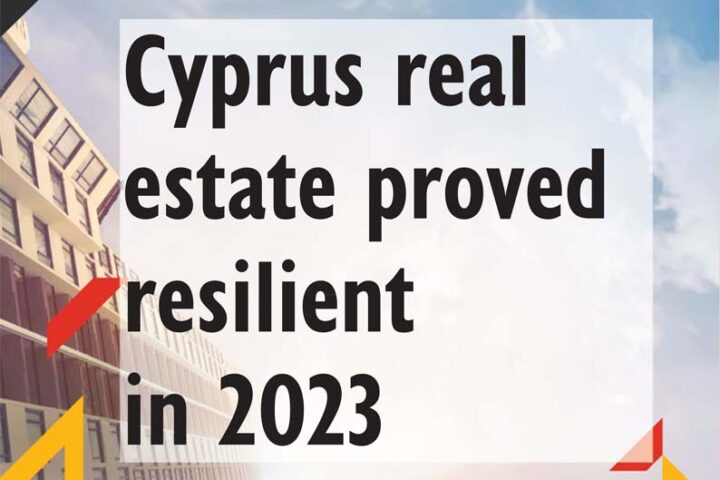Inspired by Greece’s success, there’s a proposal to fully suspend VAT on houses in Cyprus, mirroring Greece’s 0% VAT rate on new homes from January 1, 2020, to the end of 2024.
Former EU states like the UK have maintained a zero-rating VAT policy on new residential properties.
Meanwhile, current EU members, like Luxembourg, have a super-reduced 3% VAT rate for construction and renovation on new main residences, capped at €50,000 VAT amount, per home.
I recommend a temporary suspension of VAT for at least 2-3 years on homes that are used as the main residence or alternatively, a super-reduced VAT rate of 3%.
For the proposed 3% rate, I suggest revising the policy to include “reasonable” (higher) home size criteria and by accounting family size.
Moreover, to eliminate regional price disparities and to simplify the process, complete removal is recommended of property values as criteria.
The definition of a medium-value property varies among regions and types, making a uniform criterion impractical. Instead, I propose introducing a VAT tax benefit cap of €50,000.
For residential buy-to-let properties, either a temporary suspension of VAT or the introduction of a special (low) reduced VAT rate for 2-3 years.
This prompts an interesting question: could Cyprus potentially benefit from such a proposal, a similar initiative as Greece, the UK, or Luxembourg”
More affordable homes
The potential benefits of applying such a policy on homes in Cyprus are vast.
The market is expected to experience a surge in demand and supply for newly built properties, stabilising prices faster. This phenomenon will also make resale properties more affordable, fostering fair competition between new and resale options.
The increase in the supply of rental properties will naturally correct rental values, making housing more affordable in the medium term.
Moreover, the suspension and reform will compel those currently exploiting the reduced VAT rate to report rental income, contributing to a fair and transparent tax system.
Smarter VAT policy
The current VAT policy for new homes in Cyprus, capped at 130 sq.m and values up to €350,000, falls short in combating low birth rates, among others.
A more effective solution, drawing inspiration from successful practices in other European countries, involves eliminating or improving size restrictions.
This strategic shift has the potential to significantly boost Cyprus’s birth rates by fostering larger families.
More new homes also mean a greener future, with reduced energy consumption and environmentally friendly living spaces, aligning with global sustainability goals.
Revise definition of ‘new’
Addressing the outdated classification of a resale property is critical for the success of this reform.
Currently, Cyprus categorises an “old” property as one that is +10 years old. This differs significantly from other EU countries, such as France, where an old property (exempt from VAT) is any property completed more than 5 years ago. Some countries even have thresholds as low as 2-3 years.
By revising Cyprus’ definition of an old property from 10 years to 4 or 3 years, several benefits arise.
Owners who bought or will buy a home with reduced VAT will have the option to sell or rent their property well before the lapse of 10 years, without facing the burden of onerous VAT penalties.
Property companies will also be able to sell unsold stock under better conditions. This change will provide all buyers with larger property options (more supply) and better-quality homes to choose from.
A win-win proposal
While critics argue that government income would suffer from this VAT suspension, counterbalancing measures are proposed.
First, increasing transfer fees for second property purchases by eliminating the 50% discount could partly compensate for the temporary VAT loss, as the majority of sales are subject to transfer fees.
However, the suspension of VAT on homes, or the implementation of a super-reduced VAT, not only strengthens citizens’ purchasing power, but also reduces the government’s need to spend on subsidies for housing, rent or on other items like petrol and electricity.
When consumers are relieved from VAT on homes, the money they save essentially takes the place of traditional subsidies (directly and much more effectively). This not only makes homes more affordable for households, but also decreases the need of the government’s expenditure on subsidies.
In simple terms, by adjusting VAT for homes as suggested, the government can efficiently support citizens in affording homes without negatively impacting public finances. This approach redirects savings to enhance the economic well-being of citizens, eliminating the need for substantial government expenses that were previously designated for subsidies.
Moreover, this approach boosts consumption, benefiting businesses, and, in turn, these businesses contribute taxes that further support government finances. It’s a win-win that enhances both individual well-being and overall economic stability.
Charalambos Pitros has a PhD in Real Estate Economics and is a Member of the Royal Institution of Chartered Surveyors (MRICS), of the European Real Estate Society (ERES) and of the Cyprus Scientific and Technical Chamber (ETEK). He is a lecturer in real estate at the American University of Cyprus (AUCY) and a Chartered Surveyor Valuer at Zyprus Real Estate – Property Valuers & Estate Agents. www.zyprus.com
The views and opinions expressed in this article are solely those of the author.










